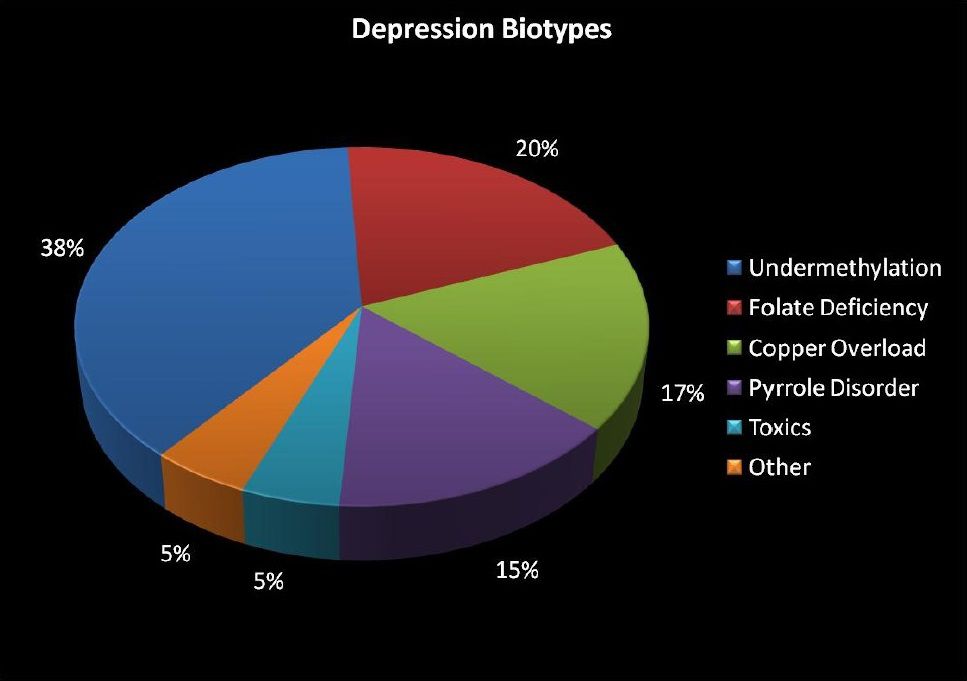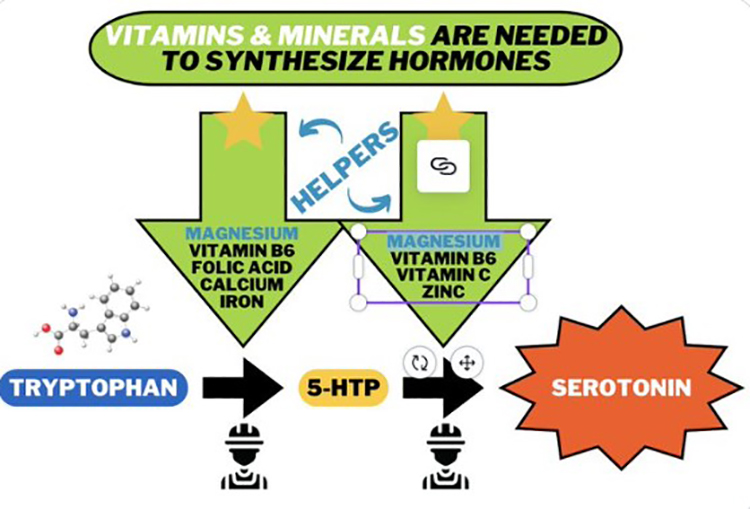Walsh Protocol Supplements for Depression

The supplements available through Biotype Nutrients are chosen by the Walsh-trained physician practitioner at Second Opinion Physician, David Epstein DO.
The goal of this site is to provide evaluated patients with top selections of nutrients appropriate for their specific biotypes. In addition, these supplements are tagged, sorted and presented so that they are easier to find and compare to one and other when searching within each Biotype category. In other words, if you were diagnosed to be an "undermethylator" according the the Walsh Approach, then there you will find supplements that you were likely recommended by our physician, to include in your plan. This is intended to take the guesswork out of the process of ordering your customized supplement plan.
Supplements are presented here in an arrangement that is according to each biotype, or each persons unique biochemistry. A Biotype Asssessment is intended to test key nutrients that may be deficient or in excess. These key nutrients play an important role in mood and behavior issues, as they are compounds and elements that are absolutely necessary to both produce and increase regulate the the activity of neurotransmitters.
The main objective with this website is to help with patients diagnosed with a specific biotype to correct those specific nutrient imbalances in order to help with depression, anxiety or other mood disorders increase. Whether the results indicate the goal is to increase or decrease the nutrients, the results will be to help manage the levels and the reuptake activity of serotonin, dopamine and norepinephrine and glutamate neurotransmitters and their receptors. Also identified are needs for additional supportive supplements including those that help with the improving the health of the GI Track, enhance liver and kidney detoxification, reduce homocysteine, increase homocysteine and support the mechanisms of cellular function, methylation and oxidation.

Tailored to Your Biochemstry
The Walsh Approach has a different standard for measuring methylation and has different target ranges for optimizing key nutrients. For methylation it is practically useless to use that information to manage mood disorders based on a genetic MTHFR or COMT test. Instead, a methyl dependent enzyme is tested when we look at whole blood histamine levels in order to identify if there is sufficient methyl enzyme to keep the levels within a certain range. Undermethylators have a high level of DNA production of a reuptake protein for both serotonin and dopamine. So effectively we treat to improve methyl groups in the body. This is typically done in the absence of folic acid and other forms of folate. While that may sound contrary to conventional medical understanding, it can be explained by recognizing that folate also impairs the methylation on those specific DNA sites that regulate these reuptake proteins. So it is not given with undermethylators, properly assessed using the histamine or plasma methylation tests panels. However, if someone is found to be an overmethylator, based on low whole blood histamine levels, in the absense of antihistamines, they will be a candidate for folate and other specific B vitamins, etc, as they are functioning with a high activity level with the neurotransmitters.
The 'Five Biotypes of Depression
- Undermethylation: This biotype is commonly associated with obsessive-compulsive tendencies, oppositional-defiant disorder, and seasonal depression. These individuals often show low serotonin neurotransmission. Nutritional treatment typically includes SAMe, methionine, magnesium, vitamin B12 and TMG, among others.
- Overmethylation: Those experiencing overmethylation often suffer from anxiety and depression, with common symptoms including sleep disorders, underachievement, and sensitivity to certain chemicals and foods. Contrary to the typical therapy for undermethylators, which aims to increase serotonin and dopamine activity, overmethylation supplements are centered on certain B vitamins such as folic acid and niacin that reduce neurotransmitter activity.
- Copper Overload: Often seen in patients with ADHD, behavior disorders, and hormonal depression, copper overload results in dramatic changes in dopamine and norepinephrine levels in the brain. Treatment focuses on nutrients that stimulate metallothionein synthesis and functioning, such as zinc, NAC and glutathione.
- Pyrrole Disorder: This disorder results in a severe deficiency of zinc and Vitamin B-6 and can lead to emotional mood swings, explosive temper, and poor short-term memory. Treatment aims to normalize blood levels of vitamin B-6 and zinc and reduce oxidative stress.
- Toxic Overload: Some individuals may experience mood and behavior disorders due to heavy-metal overload or exposure to harmful organic chemicals. Treatment involves avoidance of further exposure, hastening the elimination of toxins, and correcting underlying chemical imbalances.
Walsh Protocol Supplements for Depression, Anxiety and other Mood Disorders

This website categorizes high-quality supplements in alignment with the Five Biotypes of Depression as recognized by Dr. William Walsh's research. These biotypes are integral to understanding and addressing individual nutrient needs for those with depression and mood disorders. Determining a person’s biotype involves a combination of scientific testing — including blood and urine analysis — and a detailed symptom questionnaire. By identifying the biotype, practitioners trained in the Walsh approach can better guide patients in selecting the appropriate supplements from our range that correspond with their unique biochemical profiles. The following outlines each biotype and the related nutritional interventions designed to support those specific imbalances.

